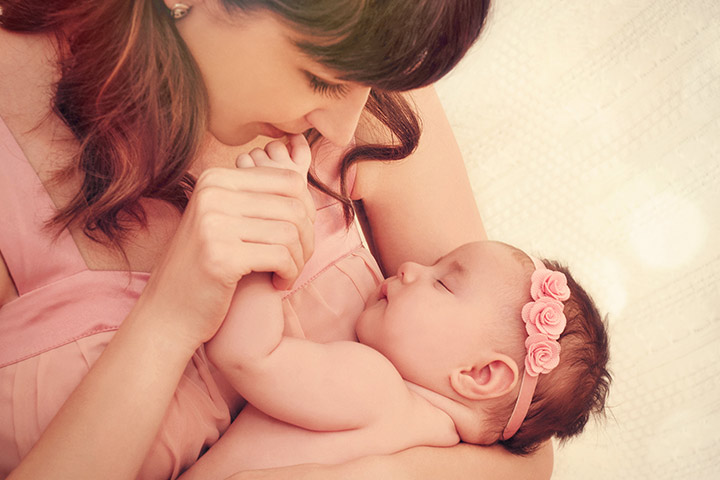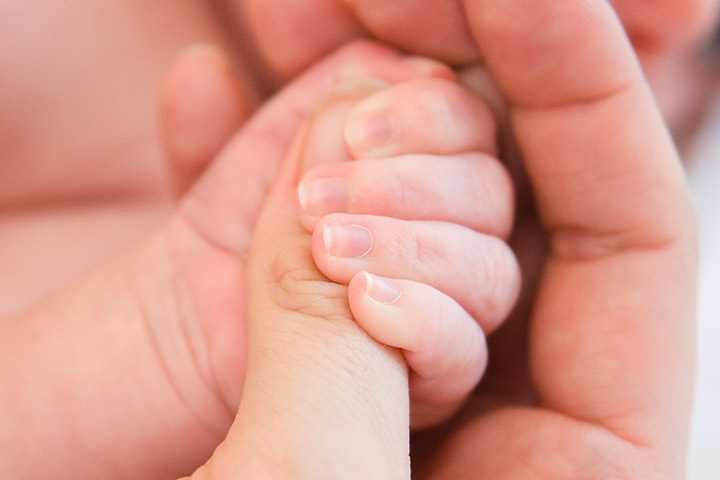As parents, the joyous feeling of bringing a new human into the world cannot be matched by anything else. There are a lot of interesting learning activities for a one-month-old baby. Babies in their first month are sensitive to the environment around them, and they are slowly but steadily developing their vision and hearing abilities. At the end of the month, as their sensory stimulation keeps increasing you might find that your baby has started responding to the bright colors and soft noises you introduce her to through these activities. Read on to know about how you can slowly introduce your one-month-old baby to the activities we’ve mentioned.
Developments In Your One-Month-Old Baby
This is the time when your baby’s development will look like a whirlwind. When you pause to take a look at them, you may notice the following developmental marks (1):
- By the end of the month, you may find they are heavier and larger than before.
- Even though one-month-old babies cannot yet grasp toys, they can still benefit from the sensory experience of touching and exploring them. Soft, textured toys or objects with different shapes and sizes can provide a variety of sensory experiences, helping babies develop their sense of touch.
- They can slowly begin to recognize the smell of their caregiver.
- Although their vision or sight has not fully developed, they can see objects in close proximity and may be able to identify some basic gestures and expressions.
- In the initial days, they may often keep eyes closed, but with time they will start responding to bright colors and contrasting patterns.
- Your baby has been familiar with your voice since she was there in your womb, and they can easily identify it. Talking or singing to your little one to keep the interaction active could be a great approach. Babies love gentle and soothing sounds and music rather than loud ones.
Ginny B., mother to two daughters, describes her experience with parenting her younger daughter, one-month-old Mina. She explains that newborns have excellent hearing and can sometimes distinguish their parents’ voices. There is no real way to interact with this, she says, other than just talking to your baby or singing to your baby. She adds, “I know for Mina it does tend to help when she hears one of our voices, mine or my husband’s, to calm down when she’s having those colic episodes. (i)”
- A baby can make throaty noises or cry to communicate hunger or other issues within the first month of life.
3 Learning Activities Of One-Month-Old Baby
Here are three interesting one-month-old baby activities that you can try. These activities for a one-month-old baby will help your little one develop the their social, emotional, and cognitive skills while being completely safe:
1. Your Baby Needs Head Support:
Your baby is too young and still needs the head support beneath (2).
- It will take time for their muscles to get stronger.
- Within a few months, they can lift up their head without support.
- You can use a headrest for them now.
- Tummy time several times a day can help strengthen the baby’s neck and shoulder muscles and help them develop independent head control over time.
2. Reflexes Of Your 1-Month-Old:
Your baby slowly develops their reflexes over time. Here are the developments you can notice (3):
- Turn head to the nipple or the bottle.
- Extend hands to hold on to you, when startled.
- Grips get stronger with time, indicating proper motor skills development.
- Grab on when you put your finger in their palm.
3. Crying:
No matter how much you prepare, you are never ready to hear your baby cry, especially for a longer time. It is their way of expressing any discomforts they are in. You may look the following factors if your baby is crying (4). It is their way of expressing any discomforts they are in.
Summer Hull, mother of three, talks about her experiences with Baby S, her 1-month-old youngest child. She says, “The hardest crying for us is often in the evening when she tends to cry more for no obvious reason. This often falls during dinner, bathtime, and bedtime, so it makes for a stressful end to the day when everyone is already tired and ready for sleep (ii).”
- So what can you do in such cases?
- Check the diapers, if they need to be changed.
- Check if they are hungry.
- Check if they need a burp.
- Check if they are sleepy.
- Check if they are uncomfortable with the environment around.
You should not worry much about crying in babies, as it is the only way of communication. You may respond to a crying baby and shower them with love but let them cry for short periods of time to help them develop their emotional skills.
Is My Baby’s Development Normal?
This is one worry every mother has, so let us clarify your doubt. You must first understand that every baby is unique and develops in her own way. Below are the simple guidelines that show potential of your baby:
- If your baby is born prematurely, they will need more time to get started with different activities. This is the simple reason why doctors give two ages to the baby born prematurely (5).
- The chronological age is calculated from the date of birth of your baby.
- The age that is calculated from the due date of your baby.
- You must measure your baby’s development against her right age and not the actual date of birth. This parameter will help your healthcare professional measure the development of your baby
You must measure your baby’s development against their right age and not the actual date of birth. This parameter will help your healthcare professional measure the development of your baby.
Seek advice from your doctor in case you have any queries.
Key Pointers
- Babies’ vision and hearing abilities are developing in their first month.
- Engage in interesting and safe activities to aid their development.
- Activities such as head support, reflexes, and response to crying help.
- Crying is natural communication and can be eased with affection and attention.
- Comparing baby development to their due date is crucial due to variation.
Welcome to our video on five essential newborn activities for the first month! We’ll show you how to bond with your baby and help them develop. Let’s get started!













